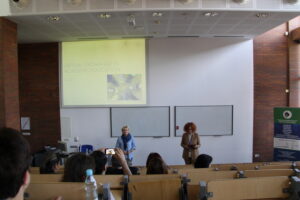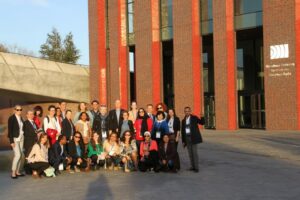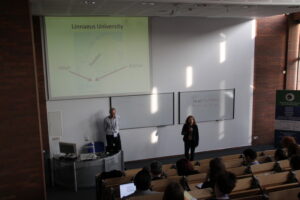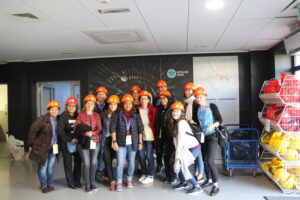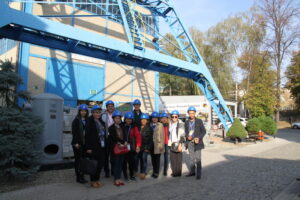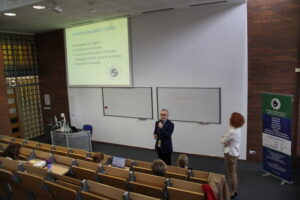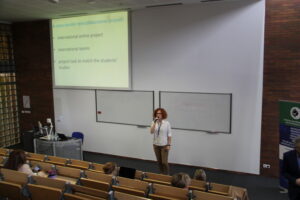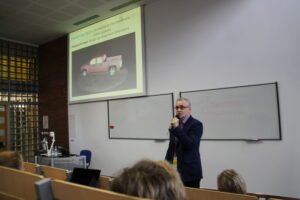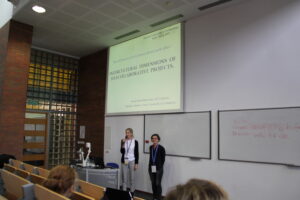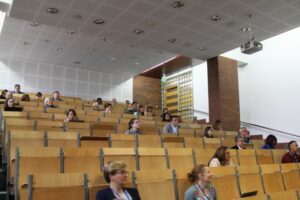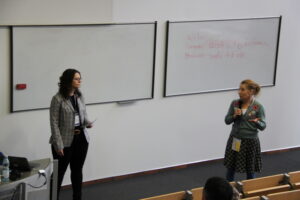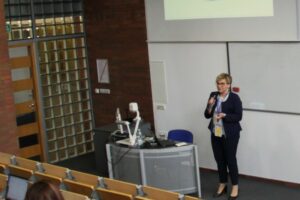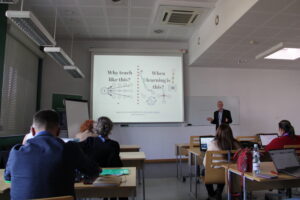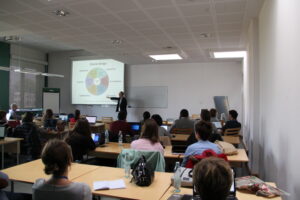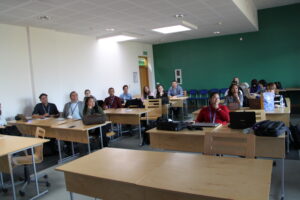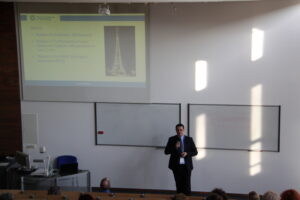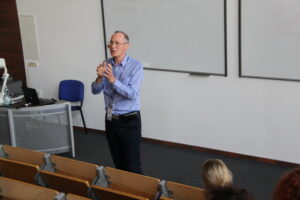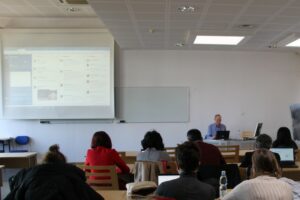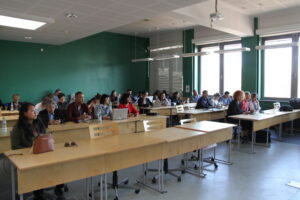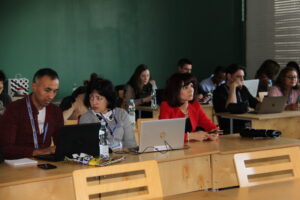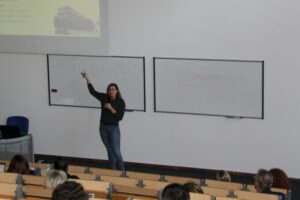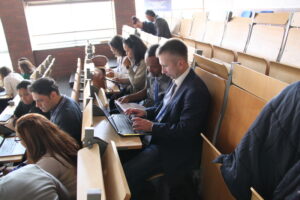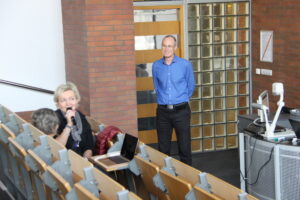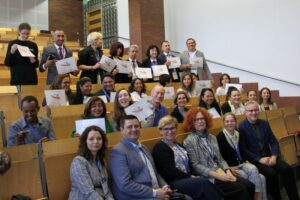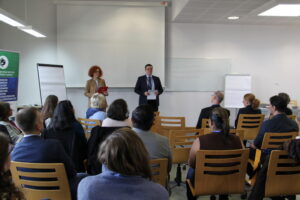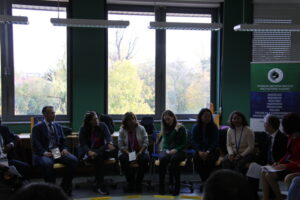
ISTW 2019
| Topic | Virtual Exchange as an Innovative Form of Distant Learning and Internationalisation in Higher Education |
| Institution | Silesian University of Technology |
| Country | Poland, Gliwice |
| Date | October 21st-25th 2019 |
| Guest Speakers |
Alastair Creelman Malgorzata Kurek Corina Löwe |
| Full programme |
Full ISTW programme |
| Open lectures |
Open Lectures for SUT Members |
| Accomodation | Hotels around SUT |
Silesian University of Technology
International Relations Office
Foreign Languages Centre
Silesian University of Technology International Staff Training Week
"Virtual Exchange as an Innovative Form of Distant Learning and Internationalisation in Higher Education"
October 21st-25th 2019, Gliwice, POLAND
Dear Partners and Colleagues,
THE INTERNATIONAL STAFF TRAINING WEEK IS ALREADY OVER
On 21 – 25 October2019, the Foreign Languages Centre and the International Relations Office of the Silesian University of Technology (SUT) organised an International Staff Training Week for university educators and employees from around the world. The staff week provided a forum to learn and share about the key concepts of telecollaboration, virtual exchange and competences required for working in international professional networks within higher education.
The programme included fascinating lectures, workshops and discussion panels related to the themes such as virtual exchange and its role in teacher education in the 21stcentury, the Erasmus+ virtual exchange programme, global classroom, language competences as irreplaceable tools in projects, methodology and didactics of foreign language teaching based on international telecollaborative projects carried out at the Foreign Languages Centre of SUT and – last but not least – webinars and how to organise and conduct them.
The participants of the International Staff Training Week not only listened to interesting lectures, but were also able to work in small groups, testing and evaluating various online telecollaboration tools.
A wide range of topics with theoretical and practical examples were covered thanks to wonderful lecturers and specialists, such as:
- Alastair Creelman - e-learning specialist in the unit of higher education development at Linnaeus University in Sweden
- Małgorzata Kurek - researcher and lecturer at the Institute of Foreign Languages at Jan Długosz University in Częstochowa
- Corina Löwe - assistant professor in German and literature at the Language Department of Linnaeus University in Sweden
- Melissa de Wilde - specialist and researcher in educational innovation from Ghent University in Belgium
- Lecturers of The Foreign Languages Centre: Grażyna Duda and Janusz Sroka, Bożena Stefanowicz, Iwona Seta-Dąbrowska in cooperation with Daniela Caluianu from Otaru University of Commerce in Japan and Renata Pelka in cooperation with Corina Löwe from Linnaeus University in Sweden, all of whom presented their international telecollaborative projects.
The programme also included the possibility of contacting the participants of the International Staff Training Week with their counterparts from SUT, as well as establishing contacts with colleagues from our partner institutions. In addition, the participants, who represented various universities from around the world, had the opportunity to discover the SUT campus and the region. After a week of intensive training, the participants returned to their home countries and universities, satisfied and full of new ideas.
In his blog on education and technology, Alastair Creelman, one of the keynote guest speakers, has written two blog posts about the week in Gliwice in which he presented a wider view on the future of student mobility http://acreelman.blogspot.com/2019/10/the-future-of-student-mobility-is.html and innovation that should be taken from project to mainstream. http://acreelman.blogspot.se/.
Thank you for participation !!
Presentations and Workshop Materials
Monday, 21 October
Virtual Exchange in academic education - a missing link? PPT
Małgorzata Kurek, Jan Dlugosz University, Częstochowa, Poland
Virtual exchanges are complex, often blended learning environments in which students can develop a range of skills and competencies which are indispensable for their future professional fields. In this talk I will present the concept of Virtual Exchange (VE), the various forms VE may take and its role in addressing the needs of tertiary-level education. I will also address the major programmes and organisations in this field and training opportunities they offer.
Tuesday, 22 October
Global classroom – virtual mobility from project to mainstream. Experience from an internal virtual mobility project at Linnaeus university PPT
Corina Löwe& Alastair Creelman, Linnaeus University, Sweden
Lessons learned and the challenges of moving from project to mainstream. See project website at https://lnu.se/en/meet-linnaeus-university/collaborate-with-us/projects-and-networks/global-classroom/
Methods and didactics of language learning PPT
Corina Löwe, Linnaeus University, Sweden
This workshop is aimed to explore an exchange of experiences of language teachers in higher education. After a brief introduction to the situation of foreign language learning and teaching in Sweden, I want to introduce and discuss some interesting and transferable teaching projects from the department of Languages at Linnaeus University. The exchange of ideas should be in the foreground and I look forward to a discussion with the colleagues in the workshop.
Designing Tasks for VE PPT
Małgorzata Kurek, Jan Dlugosz University, Częstochowa, Poland
The workshop will address the needs of those teachers and instructors who want to implement Virtual Exchange in class-to-class projects but who fear they do not have adequate experience or competence to get started. In the course of the workshop I will address practicalities of setting up VE projects, with a particular focus on designing tasks for VE and supporting them with adequate tools. I will also point out to the most common challenges, including intercultural clashes, and suggest the ways of handling them. During the workshop the participants will be assisted in designing task sequences to match their course learning objectives. The workshop will be interactive, with real-life examples and group activities.
Wednesday, 23 October
Methods and didactics of knowledge sharing and language learning in the light of some exemplary international telecollaborative projects carried out at SUT
The ability to communicate and collaborate across the linguistic and cultural borders is widely recognized as the vital 21st Century skill. The following sessions will contain some practical remarks on international telecollaborative projects. The presenters will share their experience in carrying out projects combining knowledge and language sharing, as well as developing intercultural competencies. They will talk about the benefits, challenges and outcomes of such projects, focusing on the students’ competencies while working in international teams and collaborating on common tasks. They will also present some practical ideas of how to encourage and motivate students to take part in a telecollaborative project.
International Car Project (PBL project with France and Hungary) PDF
Grażyna Duda & Janusz Sroka, SUT
Intercultural Dimensions of Telecollaborative Projects (ICC project with Japan) PPT
Iwona Seta-Dąbrowska, SUT & Daniela Caluianu, Otaru University of Commerce, Japan
Telecollaborative Rollercoaster (ICC project with Sweden) PPT
Renata Pelka, SUT & Corina Löwe, Linnaeus University
An easy recipe for a fine telecollaborative project - how to start it and how
not to spoil it (ICC projects with Armenia and Ukraine) PPT
Bożena Stefanowicz, SUT
Lecture: Collaborative online learning - how to develop an effective collaboration online and how to use digital tools to give all students a voice? PPT
Alastair Creelman, Linnaeus University, Sweden
An overview of tools and methods for effective online collaboration and how they can contribute to inclusion and community building, both online and in the classroom.
Workshop: Follow-up to the lecture above. Participants will work in small groups testing and reviewing simple tools for online collaboration. PDF
Alastair Creelman, Linnaeus University, Sweden
Thursday, 24 October
Silesian University of Technology – international cooperation PDF
Grzegorz Kłapyta, SUT
Introduction to the Silesian University of Technology. Structure, numbers, general information about research and educational offer. Strategy of internationalisation.
Open Networked Learning – experience from an international open online teacher development course based on problem-based learning PPT
Alastair Creelman, Linnaeus University, Sweden
Open Networked Learning is a free online course for university teachers on designing interactive and collaborative online courses. The course involves 14 institutions in 7 different countries and the participants work in collaborative online study groups using problem-based learning. We also admit a limited number of open learners from all over the world to increase the cultural and academic diversity of the course.
The success factors and challenges of facilitating innovation – The case of Internationalisation at Home PPT
Melissa de Wilde, Ghent University, Belgium
Within higher educational institutions, the concept of ‘Internationalisation at home’ has gained a lot of attention in the last decade. There is an increasing need to integrate international/intercultural competency development within the curriculum of all students. Even though this evolution is being applauded, when it comes to actually putting ideas into practice, several obstacles rise to the surface. In this session we will discuss how you can facilitate ‘innovation’ within the specific context of internationalization at home, giving special attention to the success factors and challenges throughout this process.
Friday, 25 October
Effective webinars and beyond. How to organize and run engaging participatory webinars offering interactive discussions, group work and even online socializing. How can we extend the webinar into virtual field trips, guided tours and virtual conferences PPT
Alastair Creelman, Linnaeus University, Sweden
Webinars are often simply copies of the traditional lecture format and offer little interaction and opportunities for network building. However, by using the tools available in webinar platforms as well as adding external tools, you can use webinars to open up your classroom.
Participatory panel discussion - “YOU ARE THE PANEL” PDF............
With kind regards,
Organising Committee of the SUT International Staff Training Week 2019
mobility@polsl.pl






